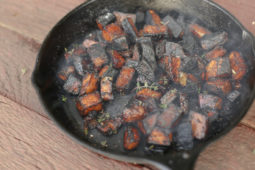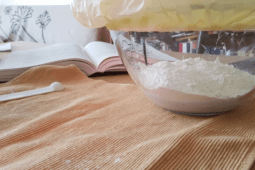An Edible History of the Hamburger

The world loves American hamburgers. Because, of course they do. They’re the world’s most perfect food. (Sorry, bananas). But few really know where and how they began…
![credit:Bonho1962 (cc) [https://en.wikipedia.org/wiki/Apicius#/media/File:Apicius_Handschrift_New_York_Academy_of_Medicine.jpg] Apicus](https://s3.amazonaws.com/manmadediy-uploads-production/photos/25157/1280px-Apicius_Handschrift_New_York_Academy_of_Medicine_large.jpg?1427091080) Recipes featuring the beginnings of what later came to be the modern hamburger date back as early as the 4th century with the Roman Apicius cookbook (pictured above) which records the isicia omentata: a baked beef patty mixed with pine kernels, black and green peppercorns and white wine. Centuries later, Genghis Khan’s calvary had a way of wrapping slices of meat and placing them under their saddles so that the meat was both ground and eventually cooked (take that for what you will), and this recipe for ground meat patties eventually spread through the Mongol Empire.
Recipes featuring the beginnings of what later came to be the modern hamburger date back as early as the 4th century with the Roman Apicius cookbook (pictured above) which records the isicia omentata: a baked beef patty mixed with pine kernels, black and green peppercorns and white wine. Centuries later, Genghis Khan’s calvary had a way of wrapping slices of meat and placing them under their saddles so that the meat was both ground and eventually cooked (take that for what you will), and this recipe for ground meat patties eventually spread through the Mongol Empire.
The term hamburger itself comes from a condensation of hamburger steak, a type of ground beef steak originating in Hamburg, Germany that gained popularity in New York in the latter half of the 19th century. Minced meat suddenly became a cheap feature of the everyman’s diet with the rise of meat grinders in American in the 1840’s, yet of none of the dishes were yet served between bread.
History has yet to reconcile the conflicting claims of the hamburger’s origin. What’s definite is that the hamburger was invented in America sometime between 1880 and 1895, and popularized during the 1904 World Fair in St. Louis.
![credit: Library of Congress Public Domain [https://upload.wikimedia.org/wikipedia/en/8/88/Louis_Lassen_Louis%27_Lunch_wagon_%281907-1916%29.jpg] Louis Lunch](https://s3.amazonaws.com/manmadediy-uploads-production/photos/25158/Louis_Lassen_Louis%2527_Lunch_wagon_%25281907-1916%2529_large.jpg?1427091087) According to the Library of Congress, the first hamburger was created by Danish immigrant, Louis Lassen (pictured above), who fashioned the original delicacy for a hurried customer in 1895 from his small lunch wagon, known as Louis’ Lunch. Louis Lunch flame broils their hamburgers “the original way” in antique cast iron stoves that cook the patties vertically and date back to 1898. You can find Louis Lunch operating to this day in New Haven, CT (pictured below), where they still serve burgers with a slice of tomato on toast. I’ve been there and they’re incredible. A word of caution however: they are famous for throwing customers out who ask for ketchup or mustard on their burger.
According to the Library of Congress, the first hamburger was created by Danish immigrant, Louis Lassen (pictured above), who fashioned the original delicacy for a hurried customer in 1895 from his small lunch wagon, known as Louis’ Lunch. Louis Lunch flame broils their hamburgers “the original way” in antique cast iron stoves that cook the patties vertically and date back to 1898. You can find Louis Lunch operating to this day in New Haven, CT (pictured below), where they still serve burgers with a slice of tomato on toast. I’ve been there and they’re incredible. A word of caution however: they are famous for throwing customers out who ask for ketchup or mustard on their burger.![credit: Dmadeo (cc) [https://en.wikipedia.org/wiki/Louis%27_Lunch#/media/File:Louis-lunch.png] Louis Lunch](https://upload.wikimedia.org/wikipedia/commons/thumb/5/5f/Louis-lunch.png/1920px-Louis-lunch.png)
Another claim to hamburger’s origin lay in the hands of a fifteen year old street vendor named Charlie Nagreen in Seymour, Wisconsin. Charlie began selling meatballs and Hamburg steaks from a street stall at the annual Outagamie County Fair, before noticing that people were less than enthused about having to eat their food by the stand instead of being free to roam about the fair. In response, “Hamburger Charlie” (as he later became known) decided to flatten the patties between two slices of bread and found he had a hit. The fair continued to sell Charlie’s burgers until his death in 1951. His statue however, remains.![credit:WIMHARTER (cc) [https://en.wikipedia.org/wiki/Charlie_Nagreen#/media/File:HamburgerCharlie.jpg] Hamburger Charlie](https://s3.amazonaws.com/manmadediy-uploads-production/photos/25159/800px-HamburgerCharlie_large.jpg?1427091094)
The list goes on with a couple lesser known stories that follow a similar narrative, however the invention story that has been given greatest prominence in recent years by hamburger historians (yes it’s a thing) is the story of what for years was an unknown street vendor who only in the last few decades was identified as Fletcher Davis of Athens, Texas. “Old Dave” has a similar tale of desiring to serve customers who were in a hurry and placing ground steak between two pieces of Texas Toast. He and his wife began serving their popular (and yet-unnamed) item as early as 1880. The only documentation for this (and all documentation regarding these stories is sketchy) is from an article by a Texan journalist who mentions a Old Dave as a street vendor who served hamburgers in a cafe at 115 Tyler Street in Athens. Old Dave then brought this invention to the 1904 World’s Fair in St. Louis which is when the hamburger’s existence was suddenly documented in earnest.
The cheap price of the minced meat and the versatility of the sandwich design took off with the rise of industrialization and America hasn’t looked back since. If anything, we’ve just kept coming up with better and better burger recipes, such as the Jucy Lucy or this oddly specific recipe from Ernest Hemingway.
To make ’em great, check out our ManMade guide to the best burgers at home:










